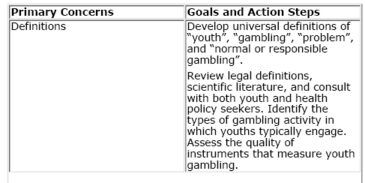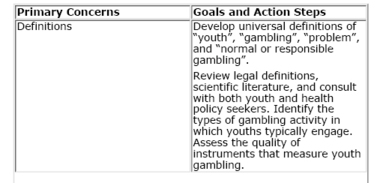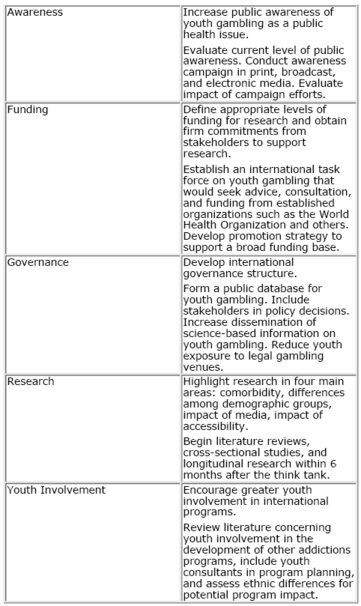Recognizing that children today are gambling in unprecedented numbers and might be at higher risk for developing problematic gambling behaviors than many adults, on May 4-6, McGill University’s International Centre for Youth Gambling Problems and High Risk Behaviors and the Harvard Medical School Division on Addictions co-sponsored the Second International Think Tank on Youth Gambling. The primary goals of the meeting were to emphasize youth gambling as a public health issue, to identify and define critical issues surrounding youth gambling, and to encourage participants of the think tank to engage in follow-up activity on those issues. Sixty-three individuals from nine countries identified six primary areas of concern.
A summary of the goals set for each of the primary concerns and the series of actions required to achieve those goals is provided below. A complete summary report can be obtained from the McGill University International Centre for Youth Gambling or from The Division on Addiction’s web site.
2nd International Think Tank on Youth Gambling Issues
The think tank was a good forum for bringing youth gambling to the forefront of public health issues. Further, the think tank provided scholars, stakeholders, and policy experts with the opportunity to develop a common language for discussing youth gambling issues. The importance of this cannot be overestimated in a relatively new and rapidly growing field. However, at this early stage in the field’s development, reaching an international consensus on such issues may be premature and difficult. Obstacles can hinder the attainment of some of the identified goals. For example, some stakeholders (e.g. youths, educators, certain gaming industries, healthcare representatives) might have been under or over-represented, thereby exerting undue influence on the process and objectives. This circumstance could lead to unanticipated problems as workers try to develop an international consensus. This, however, should not overshadow the praiseworthy efforts of the diverse group of participants seeking to take action on this pressing issue.
The WAGER is a public education project of the Division on Addictions at Harvard Medical
School. It is funded, in part, by the National Center for Responsible Gaming, the
Massachusetts Department of Public Health, the Addiction Technology Transfer Center of
New England, the Substance Abuse and Mental Health Services Administration, and the
Center for Substance Abuse Treatment.






